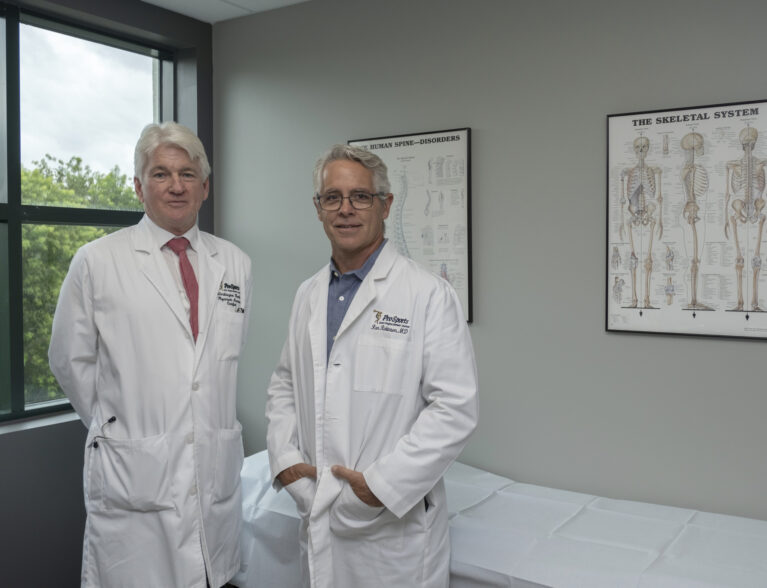
With doctors swamped and in short supply in many places, physician assistants have become key components of the healthcare system. These highly trained and licensed clinicians practice medicine in nearly every specialty and setting, and play a crucial part in the well-being of patients by supporting and collaborating with their medical colleagues.
Worthington Keville, a physician assistant (PA-C) in Vero Beach, was drawn to the medical profession early on when he joined the Navy as a hospital corpsman. When he got out of the Navy, he met an orthopedic PA and decided it was his calling.
“Having served in the Navy as a hospital corpsman I already had the required hours of medical training and enough college credits to join a PA program, which was three additional years of comprehensive book work and one year of clinical,” he said. “PA training mirrors that of medical school without the additional four to six years of residency and fellowships. We are trained in general medicine and then choose a specialty. While we don’t have an MD degree, we have training that allows us to act as a physician’s extender.”
Mayo Clinic backs up that description, stating that “a physician assistant is a licensed medical professional who holds an advanced degree and is able to provide direct patient care. They work with patients of all ages in virtually all specialty and primary care areas, diagnosing and treating common illnesses and working with minor procedures.
“With an increasing shortage of healthcare providers, PAs are a critical part of today’s team-based approach to healthcare. They increase access to quality healthcare for many populations and communities.”
According to the American Academy of physician assistants, there are 200,000 PAs in the United States today. To become a physician assistant, you need to have a bachelor’s degree and successfully complete several science prerequisites, work a specified number of hours (approximately 2,000) in direct patient care, and have a master’s degree from a program accredited by the ARC-PA, a state license and a passing score on the national certifying exam.
Additionally, PAs are required to maintain their national certification by completing 100 hours of continuing medical education (CME) credits every two years and by taking a recertification exam every 10 years.
The physician assistant profession is one of the fastest growing of all occupations. The U.S. Bureau of Labor Statistics projects the number of PAs will increase by 27 percent from 2022-2032.
Collaboration is a fundamental aspect of the physician assistant role. They work closely with physicians, nurses, therapists and other healthcare professionals to provide comprehensive care. Effective teamwork ensures that patients receive well-coordinated healthcare services.
“The scope of my duties as a PA include patient assessment and evaluation, collaboration with the physician to formulate diagnoses and treatment plans, ordering MRIs and physical therapy, administering injections, treating lacerations, patient counseling, and following the patient through their course of treatment,” Keville said. “PAs don’t do operations, but we do assist with bigger surgeries like total joint replacement surgeries and reconstruction. We help with the planning of surgery and do a lot of post op care. We basically extend the physician’s ability to provide a better level of care.”
Keville describes his patients as new-age athletes trying to thrive in life. In Vero Beach, many are seniors playing pickleball or golf and come in with sports-related injuries to the knees, shoulders and ankles.
“People are more active than they were 20-to-30 years ago and that’s good for the orthopedic business,” Keville said with a smile. “We also take care of a lot of high school injuries like broken bones and torn ACLs. We are the volunteer team doctors for both Vero High and St. Edward’s High School football teams. That’s where you find us most Friday nights.”
Keville has worked with orthopedic surgeon Dr. Peter Wernicki of Pro Sports and Elite Rehab for over 30 years. Their symbiotic relationship has stood the test of time.
“Worth’s value to my practice is immeasurable,” Dr. Wernicki said. “He helps my practice run more smoothly. He takes time with my patients and is there to assist in every one of my surgeries. He can also assist in emergencies if I’m not available. Having him here makes me 100 times more productive. He is in many ways just as good as I am because he’s been doing it for so long. A lot of times the PA is a substitute for the doctors, but in our practice, we usually try to have both of us see the patient for a double check. All of my patients are totally comfortable with him.”
Dr. Ron Robinson, Keville’s other attending orthopedic surgeon, feels much the same.
“For me, having a PA like Worth is a great asset,” he said. “All my patients are his patients, and they know us both. Having two people know everything about our patients makes it so much easier if I am busy or away as there is always someone here who knows what is going on with that patient. He diagnoses. He treats. He prescribes. The only thing he can’t do is surgery, but he is very involved with every one of my surgeries. He essentially knows everything about my patients.”
Worthington Keville received his B.S. degree in medical science from Alderson-Broaddus College in Philippi, West Virginia, and is a certified physician assistant. He’s employed by Pro Sports and Elite Rehab, 787 37th St. #200, Vero Beach, 772-978-7808.



